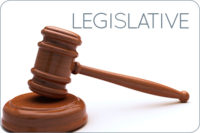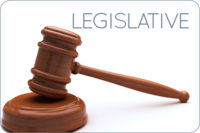The Food Safety and Inspection Service (FSIS) recently published an updated FSIS Compliance Guideline for Label Approval (guideline). The purpose of the revised guideline is to provide establishments clarity on which labels require the Labeling and Program Delivery Staff (LPDS) approval, or qualify for generic approval. The comment period on the revised guideline closed Oct. 17.
On Oct. 18, the Grain Inspection, Packers and Stockyards Administration (GIPSA) published two Federal Register notices to terminate rulemaking that would have likely resulted in increased litigation against packers for violations of the Packers and Stockyard Act (P&S Act).
The first notice withdraws the Interim Final Rule (IFR) published on Dec. 20, 2016, titled Scope of Sections 202(a) and (b) of the Packers and Stockyards Act. This IFR would have amended GIPSA regulations to eliminate the requirement that GIPSA and producers/growers demonstrate competitive injury to prove violations of Section 202(a) and (b). These sections make it unlawful for packers to engage “unfair, unjustly discriminatory or deceptive” practices and “make or give any undue or unreasonable preference or advantage to any particular person.”
The second notice indicates that GIPSA will take no further action on a Dec. 20, 2016, proposed rule titled Unfair Practices and Undue Preferences in Violation of the Packers and Stockyards Act. This proposed rule would have defined specific conduct that would be considered an unfair practice or undue preference under the P&S Act.
By way of background, in June 2010, GIPSA published a proposed rule to address complaints by producers and growers that regulated entities were using market power and concentration to harm them. Among other things, the proposed rule would have amended the agency’s regulations to codify the agency’s “longstanding” interpretation that competitive harm is not required to prove violations of Section 202(a) and (b) of the P&S Act. The proposed rule would have also amended the regulations to provide specific examples of unfair practices and criteria for determining undue preferences.
After opposition by many stakeholders, Congress used the appropriations process to prevent further rulemaking and implementation of the above proposed regulations for fiscal years 2012 through 2015; however, the Appropriations Acts for fiscal years 2016 and 2017 did not preclude adoption of the regulations. To that extent, on Dec. 20, 2016, GIPSA published the IFR to codify the agency’s interpretation with respect to violations of Sections 202(a) and (b) of the P&S Act and competitive harm. The agency also published a revised proposed rule to provide specific examples of conduct that would be deemed unfair or undue preference.
After the presidential election, GIPSA subsequently published a series of Federal Register notices to delay the effective date of the IFR. GIPSA then published a proposed rule presenting four alternatives for disposing of the IFR: 1) allow the IFR to become effective on Oct. 19, 2017; 2) suspend the IFR indefinitely; 3) delay the effective date of the IFR further; and 4) withdraw the IFR.
After considering comments on the April 12, 2017, proposed rule, GISA has issued a final rule to withdraw the IFR. In doing so, GIPSA cites to two reasons. First, the agency acknowledges that some U.S. Court of Appeals are not likely to give deference to GIPSA’s “longstanding” interpretation that the P&S Act does not require a showing of competitive harm to prove violations of Section 202(a) and (b). Although the agency cites certain case law it claims supports its interpretation, the agency agrees that the IFR would conflict with precedent in several Circuit courts and “allowing the IFR to go into effect would create an unworkable legal patchwork.”
Second, the agency states it is withdrawing the IFR because it did not satisfy the Administrative Procedure Act’s (APA) notice and comment requirements in 5 U.S.C. § 553(b) and (c). Specifically, to promulgate a rule as interim final and forego the normal notice and comment procedure, the agency must invoke the “good cause” exception and explain why the normal procedure would be “impracticable, unnecessary, or contrary to the public interest.” When issuing the IFR without additional notice and comment, the agency simply indicated it already reviewed comments on the June 2010 proposed rule that contained a nearly identical proposed regulation. The agency now acknowledges this explanation would not likely withstand judicial scrutiny because comments on the June 2010 rule would be outdated and not “fresh.” The agency also states it cannot now support it had good cause to dispense with the normal notice and comment procedures because, among other reasons, neither Congress nor a court mandated the rule, there were no deadlines for issuing the rule and there was no evidence the public would be harmed if the agency allowed another round of notice and comment.
In conjunction with the final rule withdrawing the IFR, the agency also issued a Federal Register notice announcing that it will not take any further action on the Dec. 20, 2016, proposed rule that would define specific conduct which would constitute unfair practices or undue preference. Because this proposed rule was intended to define the actions that would violate Sections 202(a) and (b) of the P&S Act without a showing of competitive harm, the agency notes the proposed rule also conflicts with legal precedent in several circuits.
It appears that both rules are dead for now, and to be frank, will not likely be resurrected outside of legislation. NP





Report Abusive Comment